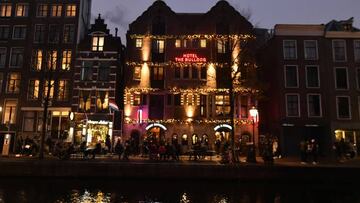LATEST NEWS
Could Amsterdam ban its red light district? The city wants to “cover up” the area
According to the legislator, sex work in the city has resulted in ‘degrading, unwanted’ behavior towards women by ‘drunk visitors.’

To better comply with the #MeToo movement and reduce nuisance tourism, the Dutch city of Amsterdam is set to vote on a law that would permanently remove brothel window curtains.
The city already voted in 2019 to ban tourists from staring at the sex workers from the windows, alleging that sightseers did not behave accordingly, and that created a negative atmosphere for the workers. As a result, the crimson curtains that now cover the windows of Amsterdam’s infamous red light district are only drawn while a customer is being entertained or when a sex worker is
However, if the city council agrees to close them for good this week, as reported by The Telegraph, this situation could drastically change. This could alter how sex workers operate and how incoming tourists perceive Amsterdam. Lawmakers already launched a campaign aimed at British tourists back in 2021, discouraging them from traveling to the Dutch capital if they only wanted to drink, have drugs, and hire sex workers.
What is being proposed by lawmakers
The liberal D66 party has suggested a proposal wherein buyers may make appointments with prostitutes through a QR code shown on their phones while the curtains at brothels remain closed so that sex workers cannot attract customers from the outside.
According to the legislator, sex work in the city has resulted in ‘degrading, unwanted’ behavior towards women by ‘drunk visitors.’
The legislation will also make additional measures to tighten down on nuisance tourists, such as a prohibition on public marijuana smoking, the early closure of bars at 2 a.m. instead of 4 a.m., and the early shutting of window brothels at 3 a.m. instead of 6 a.m.
What do the actual sex workers in Amsterdam think?
Many sex workers, however, argue that relocating the zone outside of the city will actually make them less safe, and these measurements would be bad for them. “That’s a very bad idea.” An unnamed source informed CNN in a July 2020 interview, “When you leave your shift at 5 a.m., the thieves will be lined up.” “We’d rather not settle into a hotel known for its prostitute business. Now we’re out in the open where everyone can see us. The security of our employment depends on this.” Red Light United, an Amsterdam-based sex workers organization, polled its members in opposition to the bill in October 2019 and found that 93 percent of its members were against it.
Femke Halsema to clean up the Dutch capitol
It appears that for Femke Halsema, the first female mayor of the city of Amsterdam and a leftist who is struggling with a housing problem, the opinion of the actual workers is the least important part of her campaign to clean up the city.
In a Bloomberg interview, the mayor said the city has become too expensive for regular folk due to tourism and expats settling in the Dutch capital.
“We have to tackle two problems. The first problem is what I’d call the London problem: Our city is becoming too expensive. That is also part of being an international city and having many expats living here. But it has consequences for the middle classes. It’s very difficult to find a house in Amsterdam except for the highest incomes, so our middle class — teachers, police officers, people working in health care — are leaving the city.”
“Another problem in the red light district is that it creates too much noise and causes too many problems for the people who live there. And the third problem is that it mingles with organized crime.”
“What we do not welcome is people who come here on a vacation from morals. They express a form of behavior they would not express at home. People coming here to lose their morals is a problem for us.” The mayor added.
The bill is unlikely to pass, but this doesn’t seem to be the last attempt to “Clean up the city.”






